Life's Greatest Game
Life's Greatest Game is a 1924 American silent drama directed by Emory Johnson based on the story by Emilie Johnson and starring Johnnie Walker and Tom Santschi. The movie was released on September 28, 1924 by Film Booking Offices of America. This was the fifth film Emory Johnson made after signing an eight film contract with FBO.[1][2][3]
| Life's Greatest Game | |
|---|---|
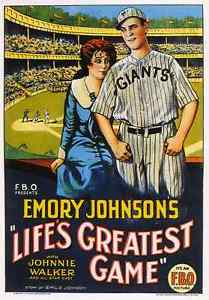 Movie Poster | |
| Directed by | Emory Johnson |
| Produced by | Emory Johnson Productions |
| Written by | Emilie Johnson Story |
| Starring | Johnnie Walker |
| Cinematography | Paul Parry |
| Distributed by | Film Booking Offices of America |
Release date |
|
Running time | 7 reels |
| Country | USA |
| Language | Silent (English intertitles) |
Plot
Emilie Johnson created this story about America’s greatest pastime – baseball. The Black Sox Scandal inspired the section of the story regarding the throwing of a world series.
Jack Donovan, played by Tom Santschi, is a pitcher for the Chicago Cubs. Jack is approached by local pool hall owner and gambler Mike Moran, played by David Kirby. Mike asks Jack to throw a game he wants to place a wager. Jack refuses. Moran decided to retaliate. Moran makes it appear he was having an affair with Jack’s wife – Jean played by Jane Thomas. Jack is enraged over his wife’s supposed dalliance. He storms down to the pool hall and beats-up Moran. After the beating is over, Moran confesses it was all a setup. Jack wants to apologize to Jean, but his wife and their small boy, Jackie Jr played by Dick Brandon has set sail for Europe.
The ocean liner the Donovan’s are traveling on strikes an iceberg and sinks. Both Jean and their son are reported lost. Since Jack now believes his family has died in the tragedy, he decides to bury his grief by dedicating himself to baseball.
Fast forward 20 years. Jack Donovan has stayed in baseball and is now the manager of the New York Giants. As the story continues, Jack’s wife and Jackie Jr survived and were not lost at sea. Jack Jr is now a grown man and a recent college graduate. Jack Donovan Jr. played by Johnnie Walker. Jack Jr’s mother starts to have cash-flow problems. To help her out, Jack Jr decides to become a professional baseball player. Even though it is against his mother’s wishes, he accepts an offer from the New York Giants.
Jack Jr reports to the Giants and recognizes his father. Jack Jr still has a chip on his shoulder – he could never forgive the father he believed had abandoned him when he was a youngster. He patiently waits for the right time to strike.
The New York Giants make it to the World Series. The Giants will play the New York Yankees. With series on the line, Jack Jr is called in as a pinch hitter. Jack Jr decides now is the time to get his revenge against Jack Sr for all the years of neglect. Jack Jr decides to deliberately strikeout, consequently losing the World Series for the Giants. At the last minute, he has a change of heart. Instead of striking out, he hits the game-winning home run. The New York Giants win the World Series.
Jack Jr then finds out his mother is in poor health. He decides now is the time to reunite his ailing mother with his father so they can spend their remaining years together. Jack Jr then pops the question to his sweetheart Nora played by Gertrude Olmstead.
Fade out
Cast
Actor Role Tom Santschi Jack Donovan Jane Thomas Mary Donovan Johnnie Walker Jackie Donovan Jr. (age 20) David Kirby Mike Moran Gertrude Olmstead Nora Malone Dick Brandon Jack Donovan Jr. (age 3) Tommy Hicks Fat Kid (uncredited)
Preservation status
According to the Library of Congress website, no known copies of this film survive. [4]
Gallery
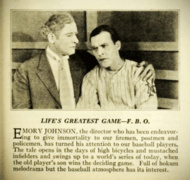 Still combined Newspaper article
Still combined Newspaper article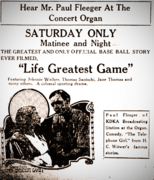 Newspaper advertisement
Newspaper advertisement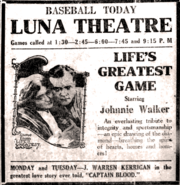 Newspaper advertisement
Newspaper advertisement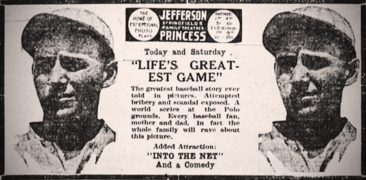 Newspaper advertisement
Newspaper advertisement
References
- Life's Greatest Game The AFI Catalog of Feature Films
- "Life's Greatest Game". www.tcm.com.
- "Silent Era : Progressive Silent Film List". www.silentera.com.
- "Life's Greatest Game / Emory Johnson [motion picture]". www.loc.gov/film-and-videos/.